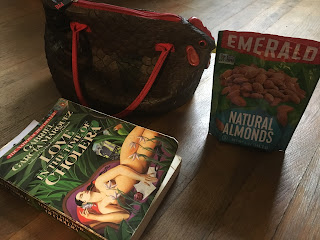UGLY GIRLS
Lindsay Hunter
Farrar, Straus and Giroux
2014
Ms. Hen found this novel in a bookstore when she was on
vacation in a faraway place. She picked it up because she liked the title, but
is usually wary about buying books she knows nothing about. She doesn’t want to
get tricked by a cute title, but then, when she looked at the back, she noticed
that one of her three favorite teachers from writing school Bret AnthonyJohnston wrote a blurb and raved about the book. She respects his opinion, and
thought that might be a sign telling her to buy the book, so she did.
Ms. Hen was caught up immediately in the girls’ world. They
are bad girls, and Baby Girl is the ugly one; she is half bald and a little
chunky. Perry is cute, with a blonde ponytail and green eyes; she’s the one
that the boys are always after. They are not friends in the way that girls are
usually friends. They don’t share their secrets with each other and gossip and
talk about boys and their hair. They do bad things.
Perry and Baby Girl steal cars in the middle of the night.
They don’t try to sell them; they just drive them around. They stay out all
night and sleep during class. The future holds nothing for their bleak lives.
Perry lives in a trailer park with her mother, Myra, and her stepfather, Jim,
who works as a prison guard. Baby Girl lives with her brother Charles, who had
been in an accident and is now disabled, and also with her Uncle Dave.
The girls are both being stalked online by Jamey, a boy who
they think is in high school, but is actually a lot older. Baby Girl is jealous
of Perry because she thinks Jamey is using her to get to Perry.
Ms. Hen would categorize this novel as a “girl buddy” novel.
There aren’t many of these in existence, but Ms. Hen knows there are some.
These girl buddies are into their delinquency for the thrill of being bad and
nothing else.
There is an overall ominous tone to this novel. Ms. Hen knew
something horrendous would happen, possibly many tragedies, and she was not
wrong. Even though Ms. Hen knew it was coming, she was not disappointed. She
didn’t know what exactly would happen, but when the climax of the novel
occurred, she was disgusted and sad.
Even though Ms. Hen thinks this is a fantastic novel, she
didn’t love it too much. There seemed to be too many visuals carefully placed
about the characters’ lives. The details of certain things seemed as if the
author is painting a picture that to her is an unknown world,
something quaint to discuss among friends who know nothing of such places. Ms.
Hen knows these places exist, but she thinks this is a portrayal that’s
forcing itself to fit into a space that is not quite right.
Other than that, Ms. Hen thinks this is a fun novel. It’s a
little too rough for the delicate book club set, so if you loved A MAN CALLED
OVE, this book is not for you. This book is meant for people who don’t mind
vulgarity and want to be a bit disturbed.



